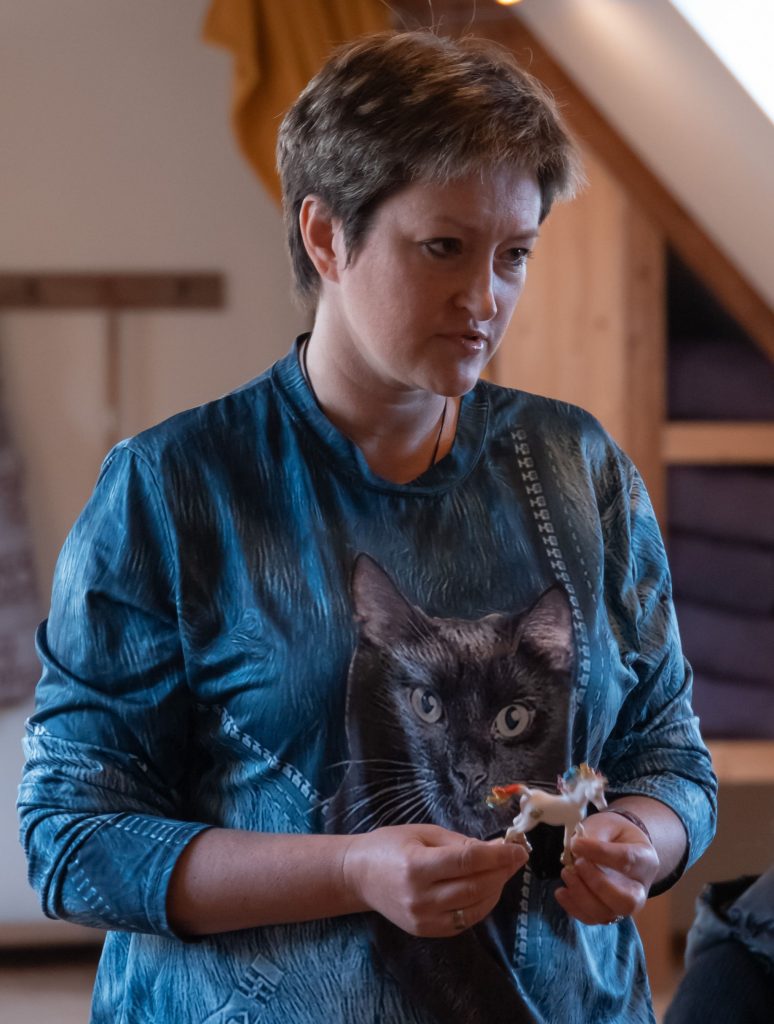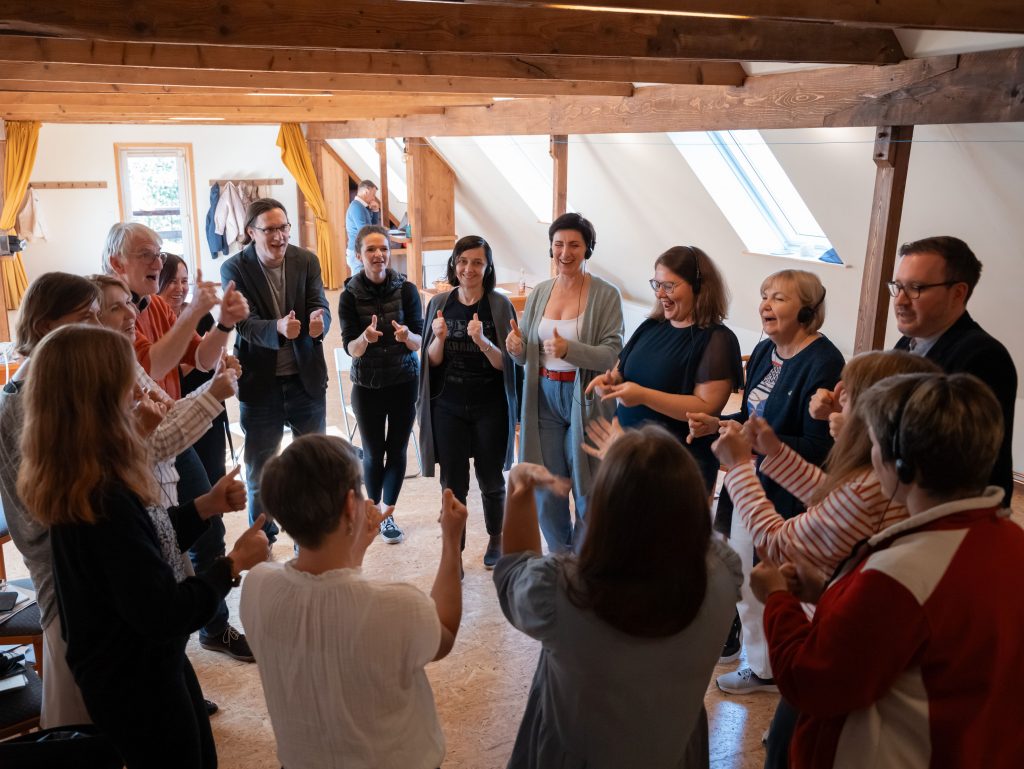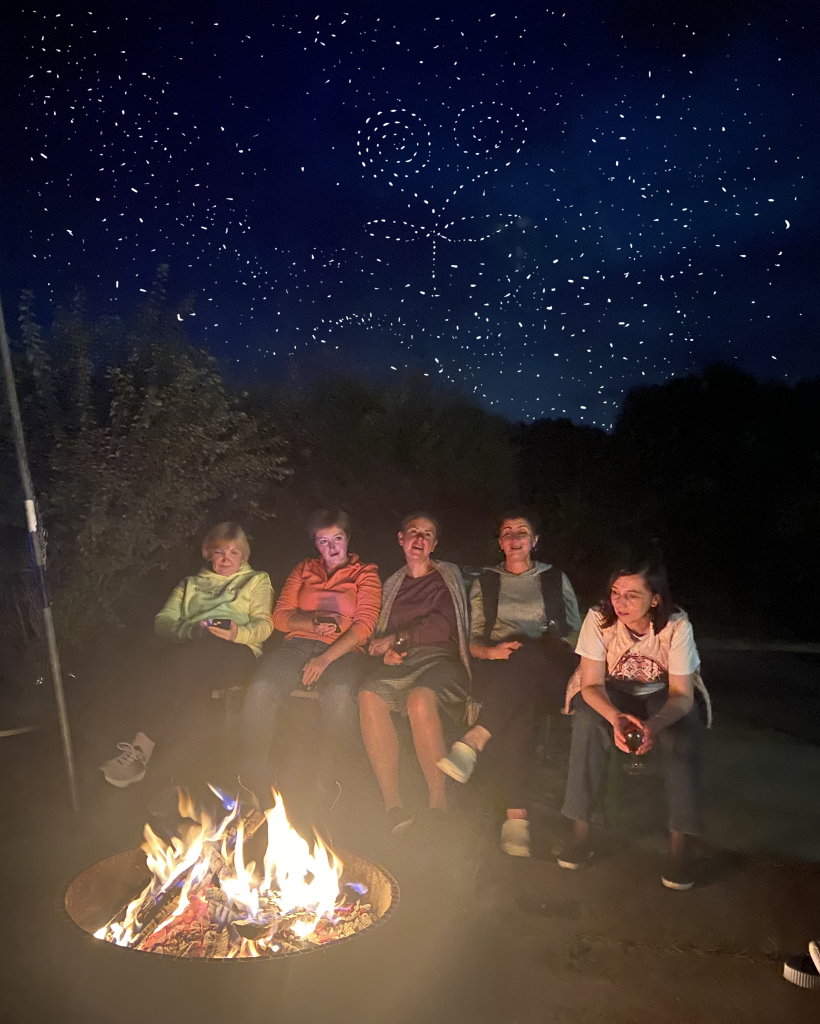
I work at Irpin Lyceum # 2, these are ordinary kids of ordinary parents. I’ve played school all my life. I used to have these toys, little plastic figurines of Thumbelina, Pinocchio, so I came home from school, organized them neatly sitting at their desks, had a register for them, gave them homework. Well, there you have it, I am now a teacher. But I love it. The school has resumed its work, but we still need to adapt. We work in two shifts, because we can only admit as many children as the shelter can take, plus teachers and administrative staff. So we start at 8 a.m. and finish at about 8 p.m., so that more children could study offline. This is what we call an “educational front”. We have to sacrifice something.
Of course, our schools were not designed with shelters, no one was prepared for that. For instance, in our school we are using a cellar that was transformed into a dance hall, and then into a sports hall, and now it’s just been furnished with benches. There’s no toilet there, but we have an exit to the ground floor with a toilet.
In case of an alarm the children come down to the shelter with a box, there is a first aid kit, some cookies in it. The little ones start crunching something in stress, that helps them to calm down. The teachers also come down to the shelter with them, primary schools kids have their own room there, they can draw, sing, dance there, whatever works to help them focus one something ese other than alarm. But it doesn’t really work with high school students. We have WIFI there, theoretically we could continue the lesson. But when they have a chance to just hang out and chat, they prefer a chat. It’s quite loud there 😁
I once had a situation in class, when a boy came in the morning to my lesson and said that his father had been killed the day before. And I felt so helpless at that moment – I could not relieve his pain, I did not know how to react. That is why I want to organize this training for teachers, so that they did not feel helpless or guilty that they could not help a kid in a difficult situation.
When I was going to the workshop, I had a question – how to understand that something is wrong with a child? Is he, for instance, playing on the phone because he’s stressed and you need to leave him alone for a while, or is he just playing on the phone?
And then I realized that I can move around the class, and come up to this kid and without even asking anything just lightly touch his shoulder, try to see, if he is feeling unwell, if he is nervous. And then I see, whether the children is stressed or not, I listen to him breathing, if it’s rapid, it means he is nervous. So I already understand what state he is in, and I don’t make any remarks, I leave him be, and then during the break I might ask if he’s managed to complete the task, and we start talking and I could have more chances to help. You are not only paying attention to what he’s doing, but you start analysing why he is doing that. Because “bad behaviour” is firstly just bad behaviour, and secondly, in 99% of cases this is a cry for help. Look at me, hear me out, help me. So this is what you’ve taught me to see. When I see something is wrong, I don’t take it personally or as an attack against me as a teacher, I understand something has happened in this kid’s life.

What I would really love to pass on to other teachers is the understanding that if something goes wrong during the lesson, it’s not always against and because of you. Of course, all the psychological education is also important, it’s important to tell them about all these amygdalas and sympathetic and parasympathetic systems, it’s necessary to understand what’s going on and how it works. But most of all I would really love to show them, that if something is wrong, it is not always against you. In 90% of cases the problem is not you, or your subject, but the child himself. Look at it from the outside with a little bit of detachment, try to understand the child. Don’t try to bring this child back to work at once, but be more considerate to him, more loyal to his needs and I think that this attitude later, when the child feels better, will positively affect the learning process as well. This was also what you’ve taught me to see.
We got a lot out of this week in Germany, and we are very grateful. Firstly, we were on a non-war territory. We relaxed a bit. We started sleeping normally on the second or third day, anxiety decreased, your body felt completely different. Plus, we’ve received lots of knowledge. For me, for example, everything was very valuable, because I am not a psychologist. And these rhythmic games. You can do it with kids for just 3 minutes during the lesson, as a warmer up, or between the tasks, just dance with them and they all focus a little bit. That’s cool. It really works. And it works in an unobtrusive way. The high-school students really liked it too, by the way, and they’ll play with the little ones from primary school to help us, for instance, when we need to come down to the shelter.

I really liked the art-therapy techniques – with bottles, the mood mandala, I am going to use it for sure. It’s amazing how in 10 or 15 minutes you can really tune in to yourself and feel full of resources… I am saying it now, and I’ve got tears in my eyes, it was such a powerful impression… I am no painter, but I sat there, with these crayons, and drew something. And I felt so different!
We did not only get the knowledge and trained the skills, you know. There was so much warmth, support, we felt emotionally recharged and very resourceful, as if we were wrapped in some warm mittens. That is why we want to preserve this atmosphere at future seminars, so that teachers warm up a little, square their shoulders, and feel, that others remember and care about them, that they are not alone with this problem.



